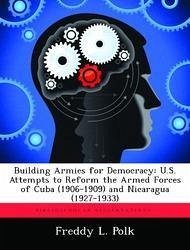This study is an historical analysis of the military reform efforts of the United States Army and Marine Corps in Cuba and Nicaragua, respectively. The study sets these cases in the political context of United States foreign policy and the political culture of the nations involved. Established concepts for the analysis of civil-military relations are employed to determine the reasons for the failure of American attempts to create professional, nonpartisan, political militaries in these nations. This study concludes that the reform efforts failed because the United States achieved operational rather than institutional change in these nations. Factors contributing to these failures were an inadequate strategy for military reform and the lack of support from indigenous political elite. The study suggests that these shortcomings may have developed, in part, because of an incomplete understanding of the relationship between military and political institutional change. This research points to the possibility that political and military institutional reforms may need to precede military organizational change, or risk an unintended redistribution of political power. It also raises questions about the pursuit of reform strategies that call for concurrent development of political and military institutions and organizations. Further questions about the policy implications of incomplete military reform.








